Vivo V21 5G
Two-minute review
The Vivo V21 5G is a solid mid-ranger that displays many of the attributes that we’ve come to expect from this fascinating brand - both good and bad.
It’s a slim, light, and stylishly built device that’s a pleasure to live with day to day. It doesn’t look quite so fresh from the front as it does the back, with a somewhat dated display notch. But there’s a good reason for that.
Vivo phones often ship with some kind of stand-out camera feature that you rarely see elsewhere, and the V21 5G is no different. Its 44MP selfie camera is arguably the best and most flexible you’ll find for this sort of money.
Ably assisted by optical image stabilization (OIS) and a dedicated dual flash system, this could be the perfect phone for wannabe vloggers on a tight budget.
The main camera system is rather more ordinary, capable of mixing it with most of its contemporaries, but certainly not among the very best.
Like previous Vivo phones, there’s a bit of a weakness when it comes to performance. It’s not that the V21 5G performs particularly poorly in day to day terms, but it’s simply nowhere near as powerful as the best of its contemporaries.
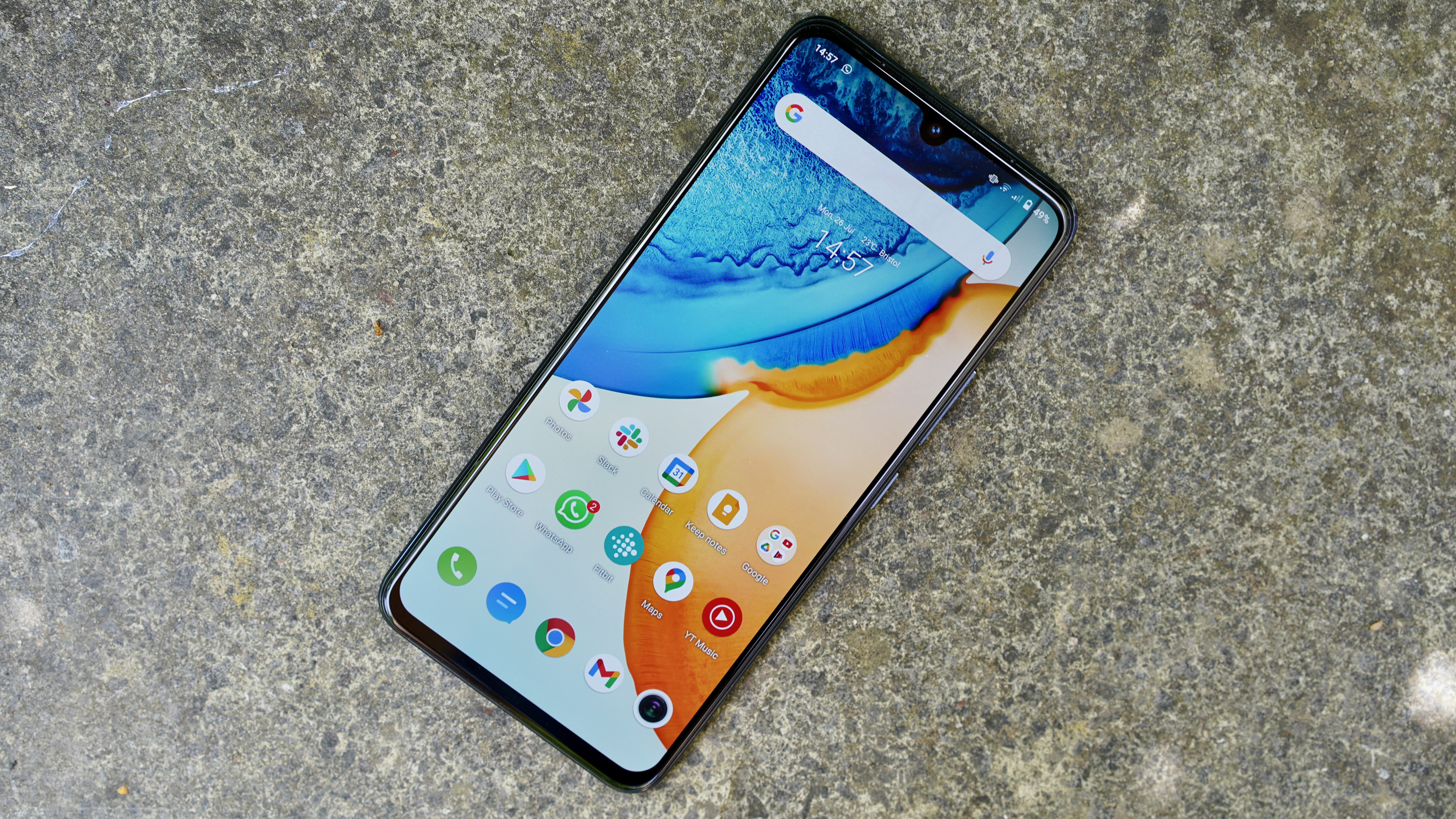
There are also a few lingering questions over the western release of the V21 5G. The model we were sent has a lot of bloatware and an incompatible mains plug. We expect each of these elements be adjusted for the appropriate markets, but it’s a sign that the brand is still somewhat tentative over pushing into wider markets.
Ultimately, while we appreciate the Vivo V21 5G’s unique qualities and very clear strengths - especially that selfie camera - it’s perhaps too niche and downright quirky to be an unequivocal recommendation.
The OnePlus Nord 2, the Xiaomi Mi 11 Lite, and the Xiaomi Poco F3 all offer better-rounded packages with more universal appeal. But selfie addicts, TikTokers, and aspiring vloggers should definitely give the V21 5G a closer look.
Vivo V21 5G price and release date
- Launched in the UK on June 17
- Retails for £399 (around $550 / AU$750)
After first launching into the Indian market on May 6, 2021, the Vivo V21 5G made its way to the UK on June 17. It costs £399 (around $550 / AU$750) for the solitary 128GB model that’s available in this country.
This places the Vivo V21 5G directly up against some serious competition. The OnePlus Nord 2 and the Xiaomi Mi 11 Lite 5G are both available for around this price, as is the mighty Poco F3.
At the time of writing there's no word on a US or Australian release for the phone.
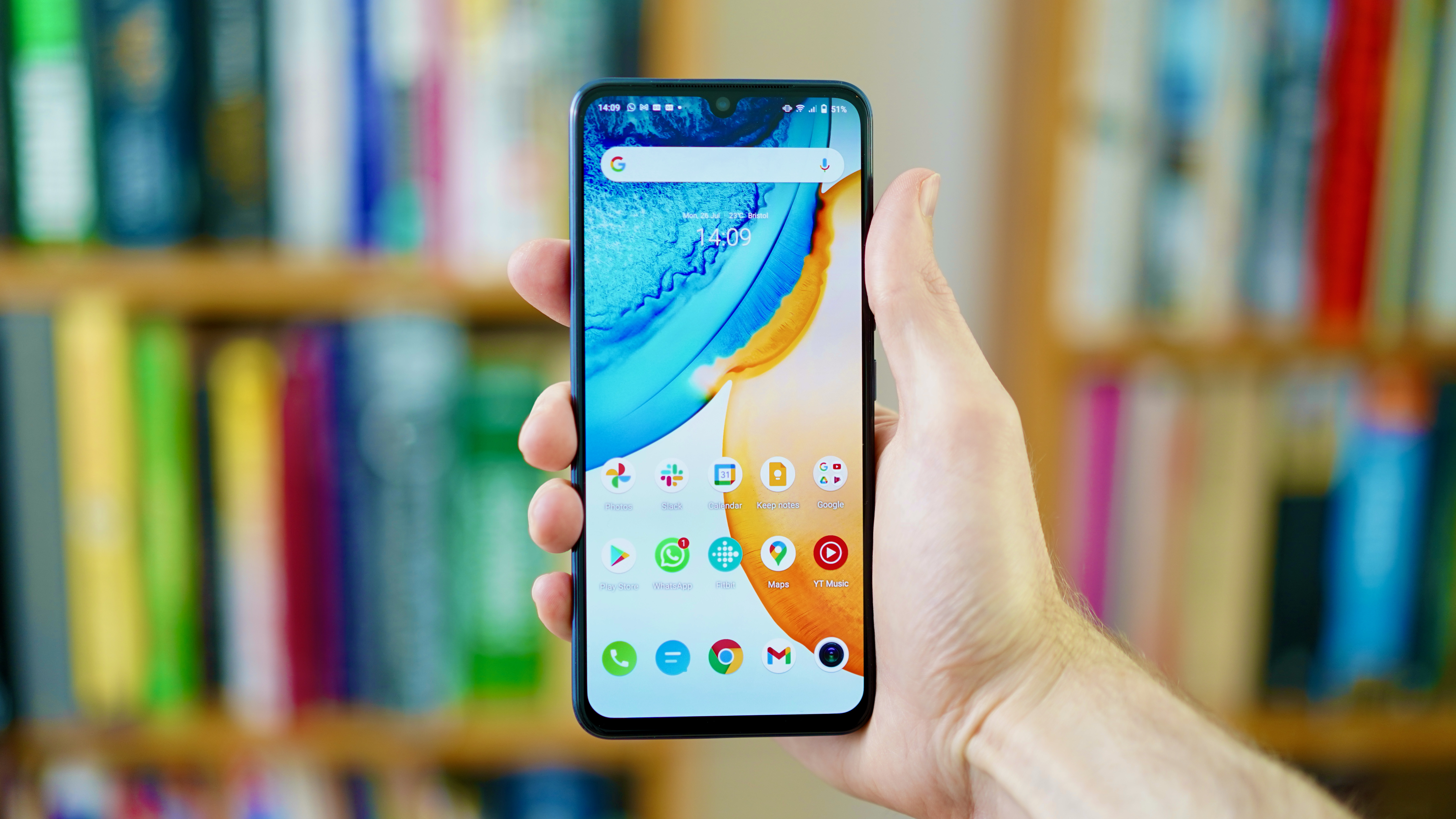
Design
- Slim, stylish profile
- Front of phone looks dated thanks to teardrop notch
The Vivo V21 5G continues the brand’s knack for producing slim, classy-looking phones - at least from the back.
Take a quick glance at the phone’s rear panel and you might think you’re looking at another member of the flagship Vivo X60 family. There’s the stylishly machined rectangular camera module, the slightly matte yet shimmery finish, our model’s stylish purple-tinged Dusk Blue tone, and the subtle Vivo logo in the corner.
Touch that rear panel and you’ll be touching silky, textured glass - the kind you might expect to see in a far more expensive device. Things get slightly less premium as you turn the phone in your hand. There’s a slightly cheap look and feel to the shiny plastic used for the frame.
A heavily-textured power button on the right-hand edge restores some of that Vivo poise. If you were holding out hope for a 3.5mm headphone jack, though, we’ve got bad news for you. At just 7.3mm thick, there seemingly wasn’t space to include such a feature.
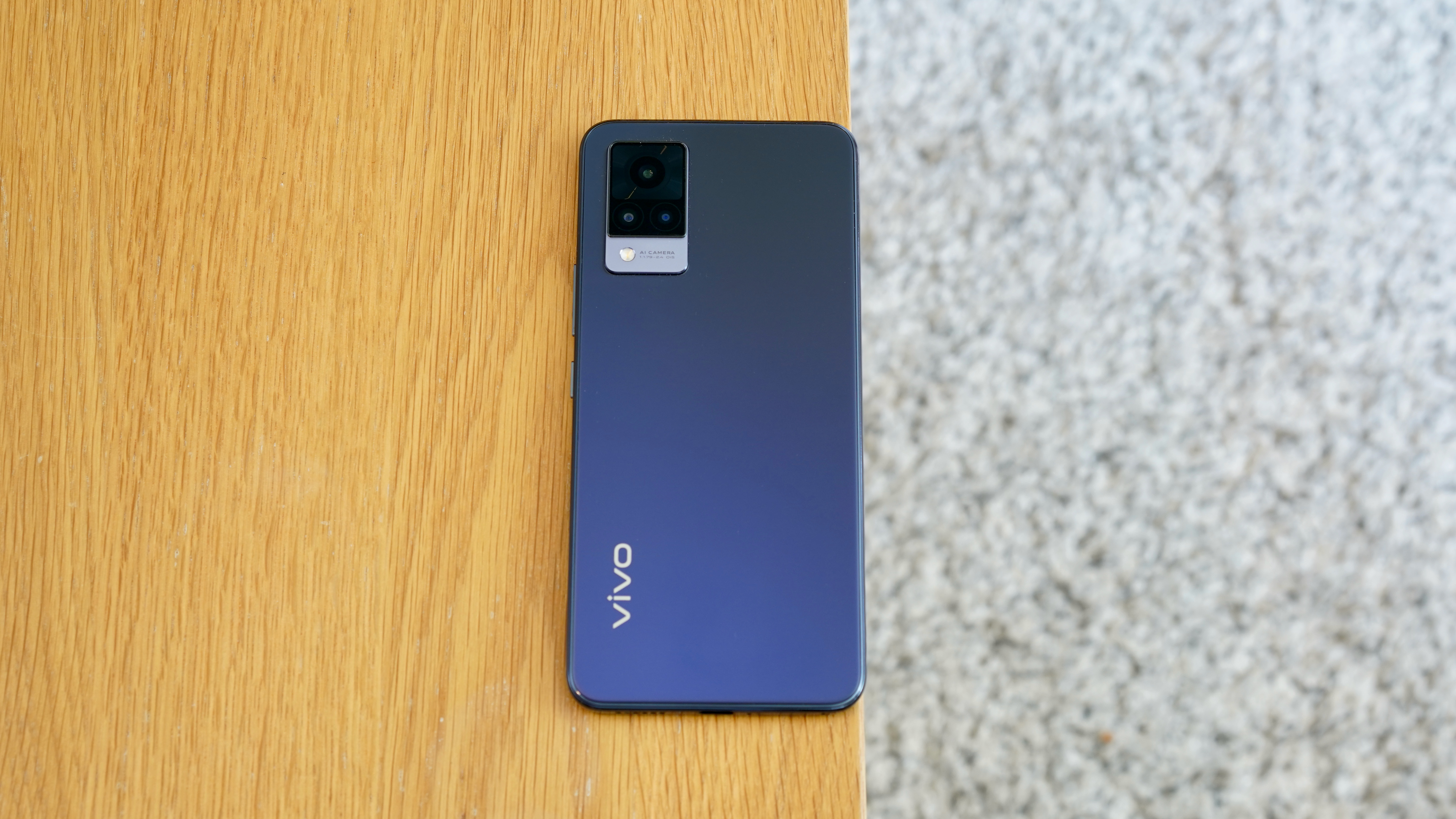
This is a reasonably light phone, too, at 176g. Despite having a very similar footprint to the OnePlus Nord 2, it’s a good 13g lighter, doubtless thanks to the use of plastic and a much smaller battery.
Complete the 180-degree rotation and you’ll come to comfortably the worst part of the V21 5G’s design. While the chin seems a smidgen less pronounced than the OnePlus Nord 2’s, and despite Vivo’s talk of 2.5D screen curves (we’re not really seeing it), your attention will inevitably be drawn to the phone’s display notch.
Yes, the very feature that defines the Vivo V21 5G for the better also does so for the worse. This teardrop notch seems to come from the smartphone design book of several years ago, before punch-hole cameras became the norm, but given the OIS and dual-LED flash included here, an ordinary sized punch-hole likely wouldn't have done the trick.
Display
- 6.44-inch 1080 x 2400 AMOLED is bright and balanced
- 90Hz refresh rate is not the absolute fastest, but still fluid
The Vivo V21 5G has a 6.44-inch 1080 x 2400 AMOLED display with a 90Hz refresh rate and HDR10+ support. It’s a very similar spec to other mid-range contenders like the OnePlus Nord 2 and the Xiaomi Mi 11 Lite 5G.
As with most phones, it defaults to 60Hz, but can be switched to either 90Hz or a Smart Switch mode that automatically adjusts to the most appropriate refresh rate for the task. It is possible to get a 120Hz AMOLED display for this sort of money, but the Xiaomi Poco F3 is a bit of an outlier in this and other respects.
The Vivo’s display gets nice and bright too, up to 500 nits in typical conditions. That’ll go even higher in auto mode, should you stray outside into bright daylight.
When it comes to color accuracy, the default Standard screen setting here was sufficiently balanced that we didn’t feel compelled to tinker with it. You can switch to the warmer Professional or the cooler Bright settings if it’s not to your liking, however, and there’s a Color Temperature slider if you wish to fine tune the profile.

Camera
- 64MP main camera capable of decent, sharp shots
- 44MP front camera the standout, with uncommonly accomplished selfies
The Vivo V21 5G’s defining feature is its camera, but not the one you might think. Its main camera offering is a 1/1.72-inch 64MP sensor with OIS, which is decent, but not spectacular.
It does a reasonable job capturing sharp, natural-looking images though. Its auto HDR facility doesn’t always handle extremes of light and shade brilliantly, but aside from that we have few complaints. No, it’s not up to the standard of the OnePlus Nord 2 with its flagship-level sensor, but few other sub-£400 phones are hitting those heights right now.
The V21’s main sensor is backed by a decidedly run-of-the-mill 8MP ultra-wide sensor and a nigh-on useless 2MP macro sensor. Again, this is much like contemporaries such as the Xiaomi Mi 11 Lite 5G and the OnePlus Nord 2, so while it’s underwhelming, it’s also par for the course.
Ultra-wide shots lack the detail and contrast of the main sensor, and the way that you access this secondary camera is needlessly fiddly. While most camera UIs would place a 0.6x option alongside the 1x and 2x, Vivo’s requires you to tap the lens option, followed by a super wide-angle button. That’s an extra stage that really didn’t need to be there.
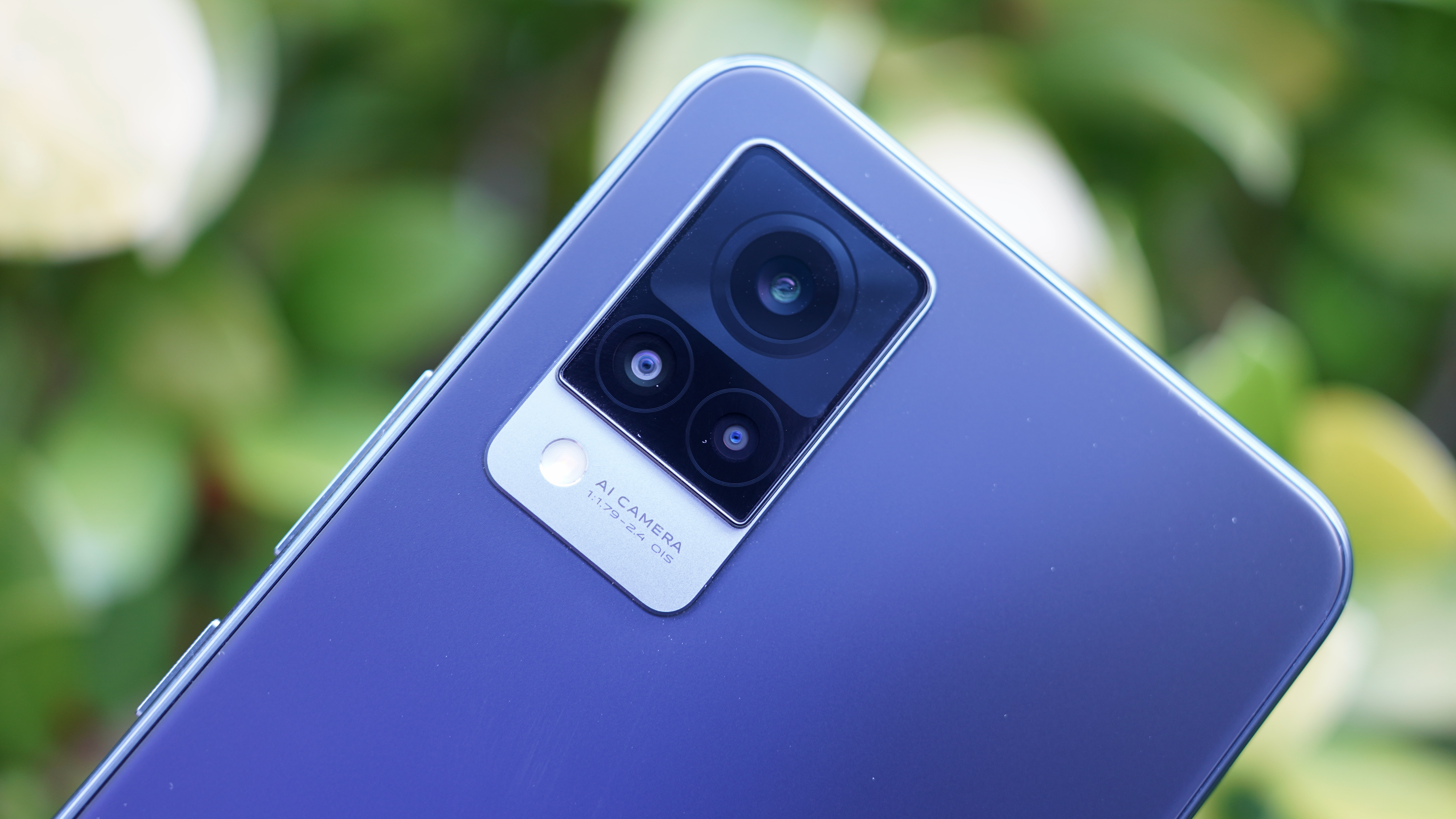
While the Vivo V21 5G’s night mode shots, for our money, just about outshine the Xiaomi Mi 11 Lite 5G’s, they fall well behind the OnePlus Nord 2 on brightness and detail once again.
Still, as we mentioned at the outset, the Vivo V21 5G isn’t here to impress you with its main camera. It’s here for the selfies, and on that front it’s really quite exceptional.
We had thought that the OnePlus Nord 2’s 32MP selfie camera was quite impressive, but the V21 5G’s blows it out of the water - and does the same to a good few flagship phones worth two to three times the money.
Vivo has taken the unusual step of packing a large 44MP selfie sensor into the V21 5G. That’s unusual enough in itself, but factor in OIS and two LED flashes (one either side of the notch), and you have an unusually well-equipped selfie machine.
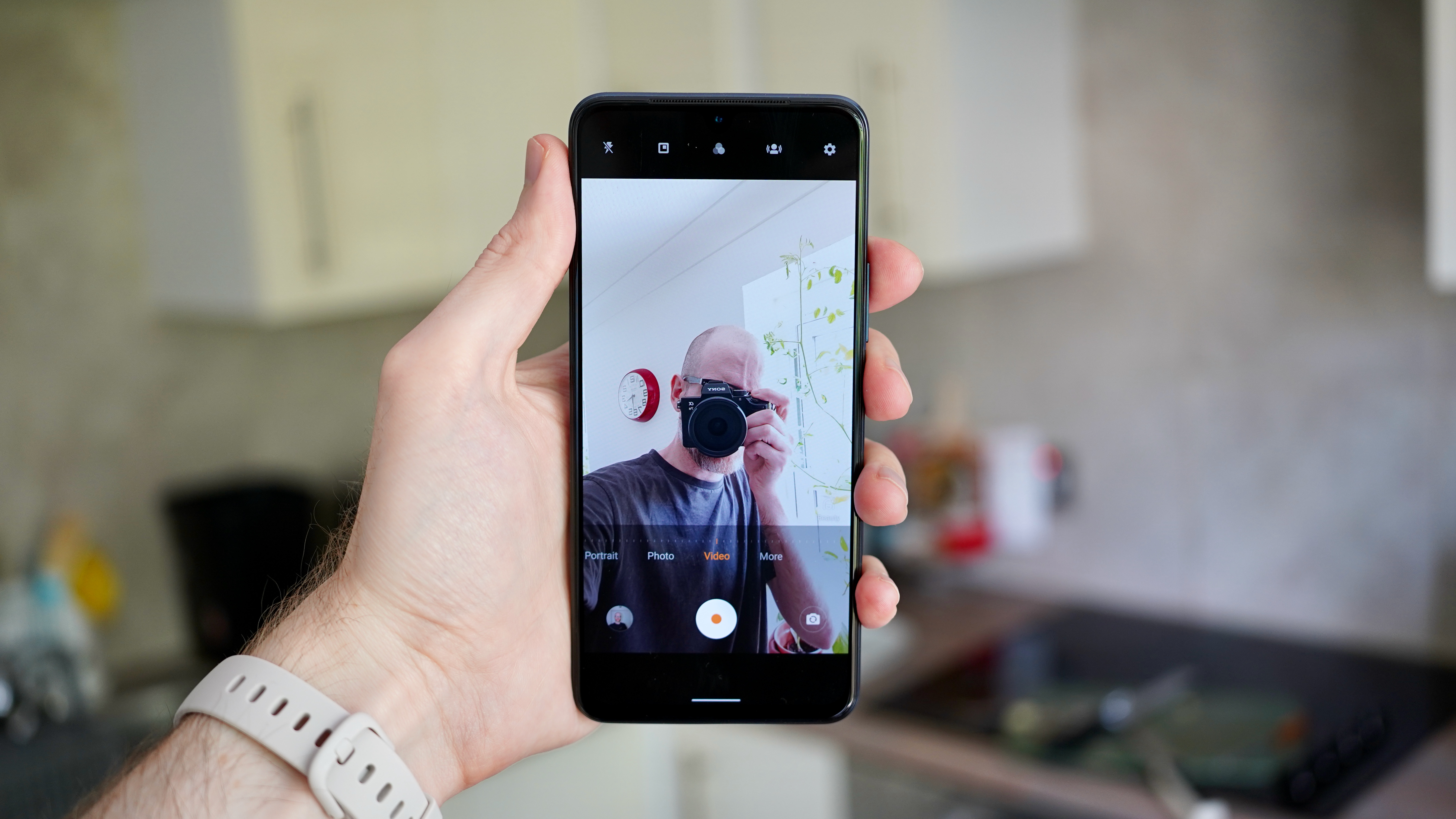
Those specs aren’t mere idle box ticking either. Selfies taken with the V21 5G have an unusual amount of detail, and are much better (albeit not perfectly) exposed than you might be accustomed to from a cheaper phone. Highlights in the background often remain clear rather than blowing out into a milky nothing.
This excellence extends to indoor and low light selfie snapping. We took a series of identical shots in challenging lighting with the Vivo V21 5G and the OnePlus Nord 2. The V21 5G’s were invariably much sharper and clearer, its skin tone remaining remarkably full and distinct.
That’s the case even with Ultra Night mode activated, at which point the V21 smartly employs a white viewfinder alongside those two flashes. This is deeply impressive stuff.
Selfie videos benefit from this setup too, with super-stable, clear footage at 1080p. Vloggers take note. You can shoot 4K selfie videos too, but you’ll lose the benefit of OIS, which is a shame.
Camera samples








Specs and performance
- MediaTek Dimensity 800U is not competitive for the price
- 128GB of storage and a microSD slot
The Vivo V21 5G runs on a MediaTek MT6853 Dimensity 800U chipset. It’s backed by a healthy 8GB of RAM, but the choice of chip is still a bit of a disappointment.
Our problem here isn’t the fact that this isn’t a mainstream Qualcomm chip. Indeed, we’ve seen this chip before in the likes of the Oppo Reno 4 Z 5G, the Realme 7 5G, and the Xiaomi Redmi Note 9T, and we found it to be a strong performer in each case. But those phones all had a much lower launch price than the Vivo V21 5G.
Leading members of the Vivo V21 5G’s peer group are much faster. The OnePlus Nord 2 launched with the significantly newer and more capable MediaTek Dimensity 1200 5G, while the Poco F3 packs the flagship-troubling Snapdragon 870, and the Xiaomi Mi 11 Lite 5G is right up there with the Snapdragon 780G.
It’s a measurably large performance gap. In Geekbench 5, the Vivo V21 5G scored an average of 1,823 for the multi-core test. The OnePlus Nord 2 scored around 2,600, the Xiaomi Mi 11 Lite 5G scored around 2,900, and the Poco F3 scored 3,369.
That gap is even wider when it comes to GPU performance. In the 3DMark Wild Life test, which simulates intense mobile gaming scenarios, the Vivo V21 5G scored around 1,607, while the OnePlus Nord 2 got around 4,230, the Xiaomi Mi 11 Lite 5G 3,160, and the Poco F3 scored around 4,090.
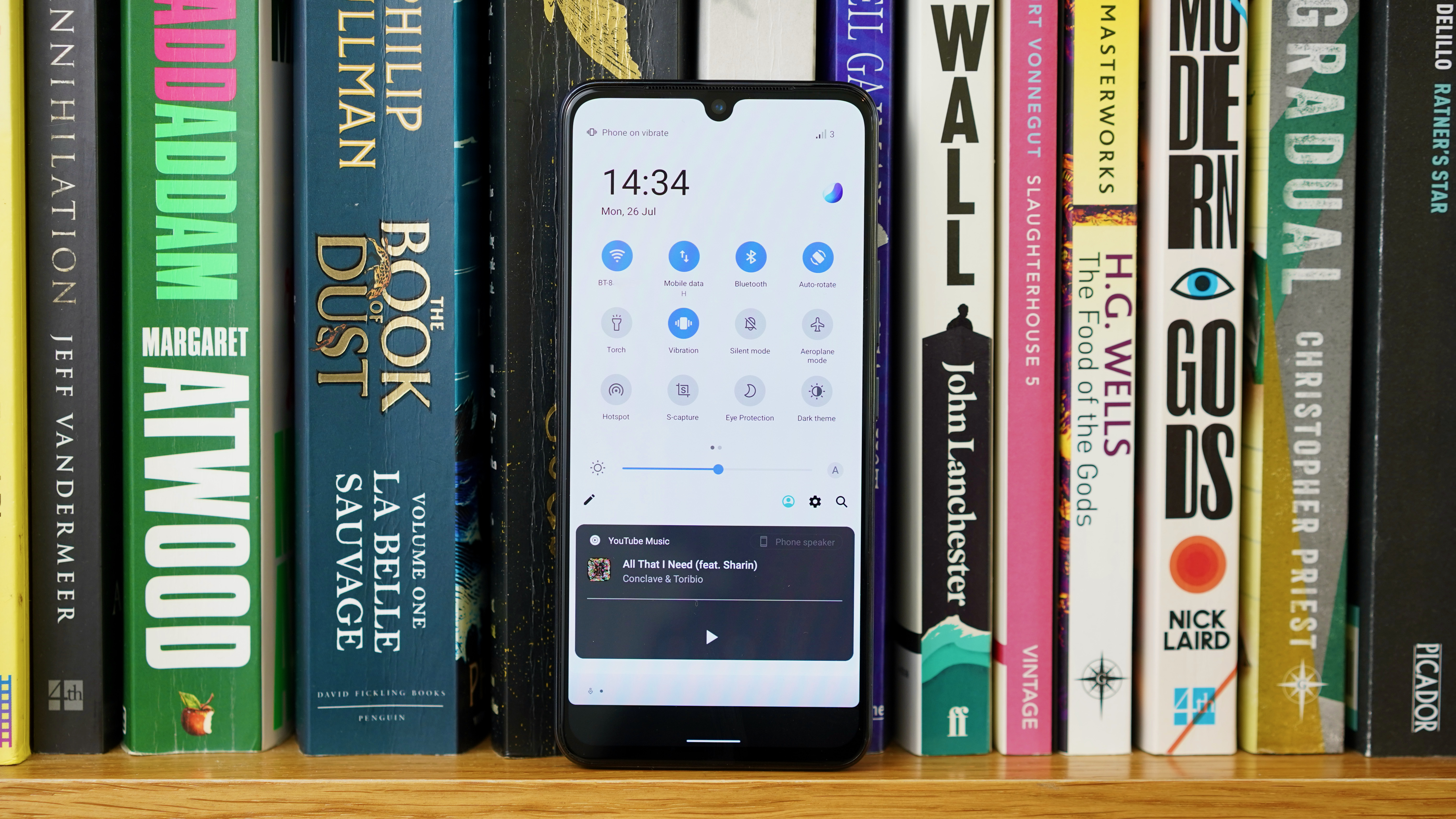
Unsurprisingly, real world gaming isn’t too great on the Vivo V21 5G. Genshin Impact defaults to the lowest graphical settings, and still doesn’t exactly run silky smooth.
In practical terms, the Vivo V21 5G snaps through regular tasks just fine. But it lacks the buttery smooth app and menu transitions of those aforementioned contemporaries, and we never quite felt that same sense of flagship opulence that we get with the OnePlus Nord 2.
At least part of that might be down to Funtouch 11.1, Vivo’s custom Android 11 UI, which is slightly too busy for its own good. We’ll give Vivo a certain amount of benefit of the doubt here though, as the model we were sent clearly isn’t intended for western markets.
It comes preloaded with apps such as PhonePe, Dailyhunt and Moj, which obviously wouldn’t appear in a European model. The more localized Vivo phones that we’ve reviewed recently have been far more stripped back in their software offerings, so we’ll just mention the boatful of bloatware that has found its way onto this particular Vivo V21 5G and move on.
Funtouch itself is otherwise a fairly light, stock take on Android these days. It’s not as focused or cohesive as OxygenOS or even Sony’s UI, but it’s no worse than Xiaomi’s MIUI or Oppo’s ColorOS.
The storage provision is strong, with 128GB of built-in memory and a microSD card slot should you wish to crank that capacity up further.
Battery life
- 4,000mAh battery good for two days of light to moderate use
- 33W charger will get you to full in less than an hour
The Vivo V21 5G runs on a 4,000mAh battery, which is a little smaller than those of the rival handsets mentioned elsewhere. There are no worries on the stamina front, though. We were routinely able to get through a full day of usage with plenty to spare.
Indeed, a full 15-hour day with around 4 hours of screen-on time would generally leave us with around 50% left in the tank, even with the display set to 90Hz. If you’re not a particularly heavy user or a committed gamer - and if you are, this really isn’t your phone - then you could very well get through two full days on a single charge.
Even on the media consumption front, the Vivo V21 5G does pretty well. We ran a 90-minute looped 720p video, with the screen at full brightness, and the Vivo lost 8%. This compares favorably with the Xiaomi Mi 11 Lite 5G, which lost 11%, while the Poco F3 lost a similar 7%.
The V21 5G comes with a 33W fast charger, which is the same as the Xiaomi Mi 11 Lite 5G and the Poco F3, but well short of the OnePlus Nord 2 5G’s 65W monstrosity. It’s apparently good for zero to 100% in 52 minutes, but we’ll just have to take Vivo’s word on that. The model we were sent came with an Indian plug, so we were unable to test it.
Should you buy the Vivo V21 5G?
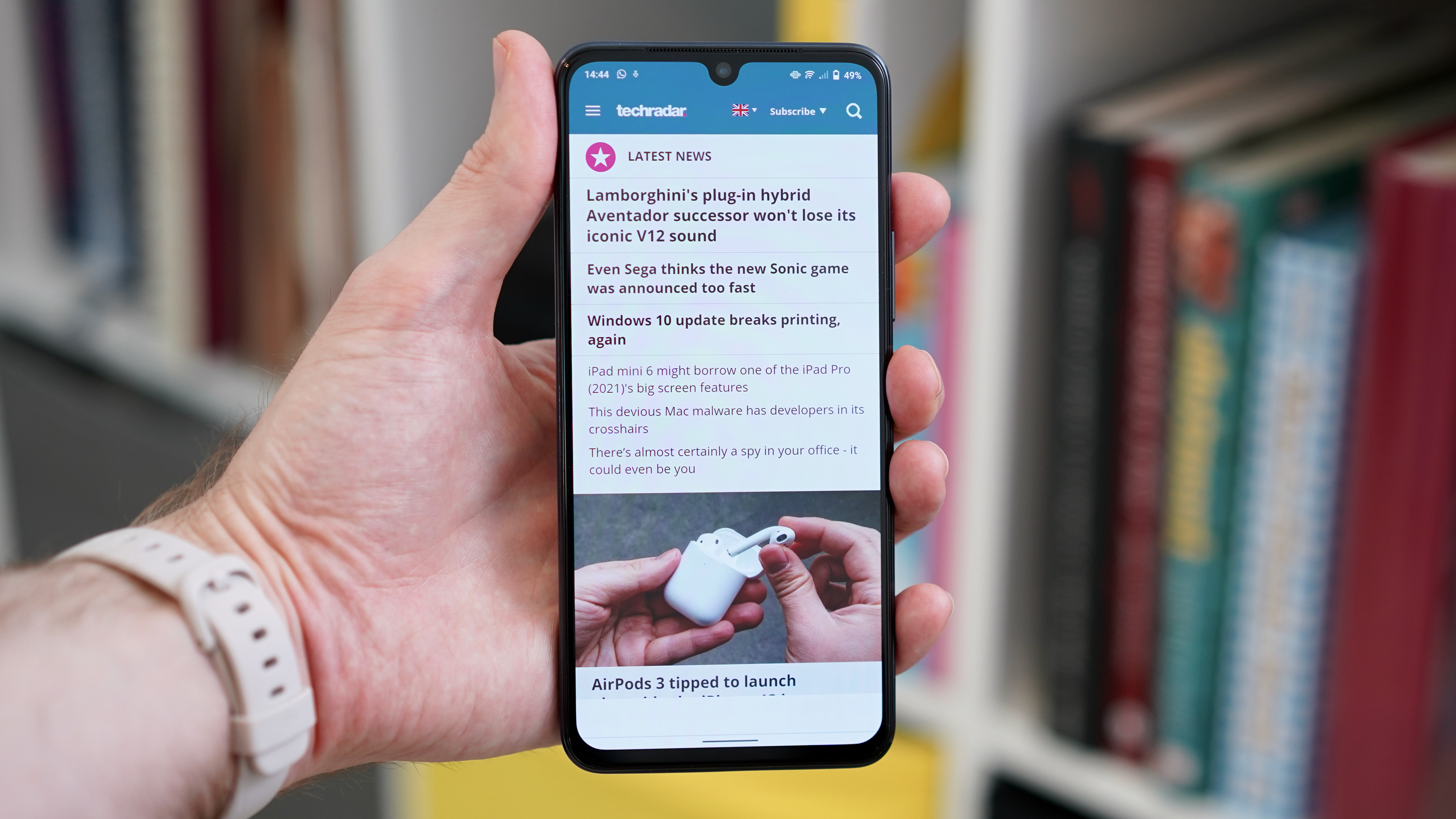
Buy it if...
You take more selfies than any other picture type
If you’re a young, self-promoting, social media-obsessed type, then you should seriously consider making the Vivo V21 5G your next phone. Its 44MP selfie cam takes freakishly good selfie shots in all lighting condition, and you simply won’t get better for the money - or even for a good deal more.
You’re a vlogger on a budget
It’s not just selfies that the Vivo V21 5G does well. Its OIS-assisted front camera is also great for capturing super-stable footage. The next time you post a horribly shaky out-and-about confessional to your social network of choice, think about what you could have achieved with the Vivo V21 5G.
You’re fed up of chunky phones
Mid-range phones are getting bigger, with expanding waistlines accommodating larger batteries and more premium constructions. The Vivo V21 5G still has excellent stamina and a classy design, but it does so in a super-skinny and relatively light body.
Don't buy it if...
You’re a serious gamer
You don’t need a flagship phone to get a great gaming experience, but the Vivo V21 5G simply doesn’t have the GPU power to handle the best games at elevated settings. The Poco F3, OnePlus Nord 2 or Xiaomi Mi 11 Lite 5G give you way more polygon-pushing power for the same money.
You want super-clean software
Vivo’s Funtouch UI tends to be a little more reserved in its western iteration, but it’s still slightly busy and gaudy. Certainly compared to the OnePlus Nord 2’s OxygenOS or the Pixel 4a’s stock Android, at any rate.
You hate notches
That stand-out selfie camera comes at a cost: you have to put up with an obtrusive teardrop notch that makes the Vivo V21 5G look like a much older (or at least cheaper) phone from the front. Unless you find this less distracting than all those punch-hole cameras, of course.
First reviewed: July 2021
0 comments:
Post a Comment